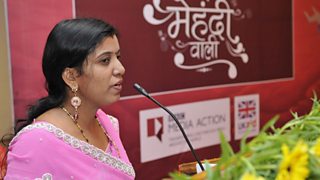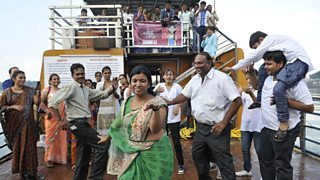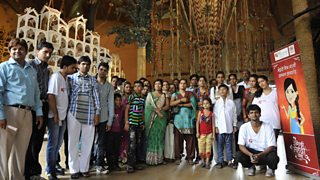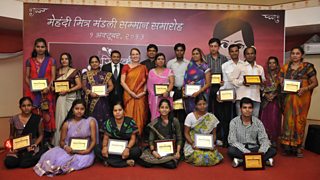“Didi, please don’t let Mehendi die!”
Radharani Mitra
National Creative Director and Executive Director in India for ÷˜≤•¥Û–„ Media Action
"Didi, please don’t let Mehendi die!” So begged Jyoti Bhadoria, a young mother of three from Madhya Pradesh, at a truly special event last week in Bhopal.
She had travelled from her tiny village after winning a competition on our radio show Khirki Mehendiwali ('Mehendi Opens A Window') which sets out to improve family health in Madhya Pradesh by telling the story of a feisty young woman called Mehendi who dreams of becoming a radio DJ.

"From the first episode to the last, the whole journey has been a truly memorable experience," Jyoti said. "We want to continue this journey, so please don’t stop the show! Didi, don’t let Mehendi die!"
Interactive radio
Jyoti was joined in Bhopal by more than 20 other winners, who had all become part of Mehendi Mitra Mandali, (Friends of Mehendi club) by answering a question asked on the show. Ã˝Ã˝
Our team had come up with the idea of a competition to make the programme 'stickier' and give our audience a more interactive experience. Listeners answered the question by phoning a number announced on the show and then we phoned them back. Ã˝
There were no big money prizes, just the opportunity to join the Friends of Mehendi club and win a visit to Bhopal for a 'felicitation ceremony' - a day of celebration. Ã˝But during its 37-episode run over three months, Khirki Mehendiwali received nearly 11,000 calls and thousands of post cards. Ã˝
The lucky winners came to Bhopal from all over the state and spent the entire day sight-seeing in the state capital, the high point being a cruise on Lake Bhoj.Ã˝

Then in the evening, they were awarded with plaques and watched a performance by local musicians. When the winners entered the event's venue, an invited audience gave them a standing ovation.
Listening and learning
It was a terrific day that really impressed on me the difference a radio programme can make.
Jyoti told me that she invited her neighbours over for tea to listen and enjoy the show and how she and her friends started to relate to the characters, chatting about the plot‚Äôs twists and turns and the health advice given by the show‚Äôs medical character, Dr Anita. Ã˝
This power of radio to trigger debate was picked up by P P Singh, the head of Bhopal‚Äôs National University of Journalism, who also attended the event. He described Khirki Mehendiwali as ‚Äúheart and brain mixed in equal proportion‚Äù and praised its ‚Äúinteresting format that aims to touch lives‚Äù.Ã˝
Another competition winner, community health worker Sushila told me, ‚ÄúAlthough I‚Äôm a health worker, listening to Mehendi and Dr Anita, I realised I need to know a lot more. I have learned many new things. This show has really helped me in my chats with the women in my area.‚ÄùÃ˝
Dr Krishna Swamy, from Indian government‚Äôs technical unit which is supported by the UK‚Äôs Department for International Development, heard the women‚Äôs testimonies and agreed with Sushila‚Äôs observation that radio can really help. ‚ÄúFor raising awareness about basic issues like health and livelihood, you need to tell stories through a basic medium like radio,‚Äù he said.Ã˝
Real support
Some of the competition winners were fans of the show from the start. Manisha Mehra, a widow working as domestic help, said, “When I heard the first episode, I knew I had to hear it all because I need to pass this knowledge on to my teenage daughter.”
The support a radio show can provide was also obvious. “Dr Anita and Mehendi became my family and taught me about getting ready for birth, delivery and post-natal care,” a woman called Subhashini said.
She lives with her husband, a farmer, in a remote village. They are expecting their first child but have no family elders living close by. ‚ÄúIt‚Äôs because of the show that I‚Äôm not worried about having a girl or a boy,‚Äù she added. ‚ÄúWe have understood it‚Äôs really the same.‚ÄùÃ˝

The Friends of Mehendi club on their sightseeing trip in Bhopal.
Opening a windowÃ˝
The Bhopal event itself was, for a lot of the winners, a real eye-opener. “I am only allowed to visit my mother’s family home once a week,” said Gayatri Lochkar from the city of Itarsi. “But because you all invited us so affectionately, my husband agreed to accompany me here,” she said.
Laxmi Sen from Sagar also said, “I think, after my marriage, it was the first time I laughed so much. I made some good friends from different parts of the state – my window has opened indeed.” Leela Kishan, who is visually impaired, travelled to Bhopal with his sister-in-law and was very emotional when he told me, “I’m here to salute the spirit of a healthy family – good health is the key to happiness.”
The ceremony ended with emotional speeches by Jyoti and another young woman, 23-year-old Sakshi Gupta.Ã˝
Like Mehendi, Sakshi would love to build a career in the media. ‚ÄúKhirki Mehendiwali has helped me in so many ways,‚Äù she said. ‚ÄúI‚Äôm trying to get my friends listen to the radio. I want to be like Mehendi but my father can‚Äôt pay for any courses.‚ÄùÃ˝ I hope like Mehendi, someone helps open her ‚Äòwindow‚Äô.

We have yet to fully evaluate the show’s reach and impact. But the stories we heard last week left the Khirki Mehendiwali team inspired and even more determined to listen to the women like Jyoti and not “let Mehendi die.”
Related links
Follow ÷˜≤•¥Û–„ Media Action on and
